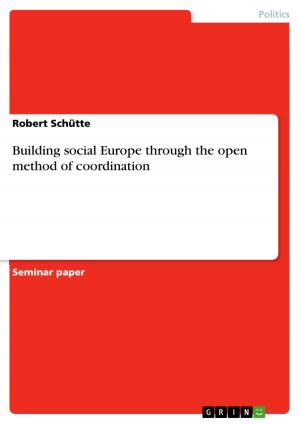The impact of a mega sports event for a nation
Analysis of the FIFA World Cup 2006 in Germany
Nonfiction, Sports| Author: | Anja Wyludda | ISBN: | 9783640358564 |
| Publisher: | GRIN Publishing | Publication: | June 25, 2009 |
| Imprint: | GRIN Publishing | Language: | English |
| Author: | Anja Wyludda |
| ISBN: | 9783640358564 |
| Publisher: | GRIN Publishing |
| Publication: | June 25, 2009 |
| Imprint: | GRIN Publishing |
| Language: | English |
Seminar paper from the year 2008 in the subject Sport - Sport Economics, Sport Management, grade: 7 (2,3), Copenhagen Business School, course: Sports Economics, language: English, abstract: The assignment answers the question which impacts a mega sports event like the FIFA World Cup 2006 in Germany can have on a nation. Cultural, environmental and economic effects - or tangible and intangible effects - are analysed in this case. The cultural impact on Germany was significant. The supporting programme of the World Cup helped to increase Germany's reputation all over the world and improved its hospitality image worldwide. Environmental aspects were in the focus during the World Cup and several important actions helped to solve problems like waste management, water consumption and electricity consumption. The sustainability of these actions has to be observed in the future. The economic aspect was less significant. Although Germany invested large sums in infrastructure and stadiums, and had earnings of 500 million Euros from tourists, the growth in GDP is negligible. This is a general problem in large economies, because a movement of GDP needs extremely high monetary items. But in conclusion the FIFA World Cup 2006 was a success. Not from an economic point of view but with regard to international relationships and the reputation of Germany. A mega sports event needs a careful planning and a high willingness to invest money in infrastructure and venues. Then the impact can be very positive and must not be measured only from a financial point of view.
Seminar paper from the year 2008 in the subject Sport - Sport Economics, Sport Management, grade: 7 (2,3), Copenhagen Business School, course: Sports Economics, language: English, abstract: The assignment answers the question which impacts a mega sports event like the FIFA World Cup 2006 in Germany can have on a nation. Cultural, environmental and economic effects - or tangible and intangible effects - are analysed in this case. The cultural impact on Germany was significant. The supporting programme of the World Cup helped to increase Germany's reputation all over the world and improved its hospitality image worldwide. Environmental aspects were in the focus during the World Cup and several important actions helped to solve problems like waste management, water consumption and electricity consumption. The sustainability of these actions has to be observed in the future. The economic aspect was less significant. Although Germany invested large sums in infrastructure and stadiums, and had earnings of 500 million Euros from tourists, the growth in GDP is negligible. This is a general problem in large economies, because a movement of GDP needs extremely high monetary items. But in conclusion the FIFA World Cup 2006 was a success. Not from an economic point of view but with regard to international relationships and the reputation of Germany. A mega sports event needs a careful planning and a high willingness to invest money in infrastructure and venues. Then the impact can be very positive and must not be measured only from a financial point of view.















